Teen Anxiety 101
In 2023, about 1 in 6 U.S. teens (16.1%) had been diagnosed with an anxiety-related disorder. This marks a 61% increase (from 10.0% to 16.1%) since 2016 (2023 National Survey of Children’s Health). The rise in teen anxiety seems to mirror the growing prevalence of social media and rapidly changing lifestyle factors. Teens often present to adults with various anxiety related behaviors, including irritability, withdrawal, and perfectionism, often intensified by the relentless pressure of idealized images and social comparisons. Poor sleep and diet can further augment such anxiety levels. How can parents help their anxious teens navigate this complex emotional landscape? The answer lies in effective communication and therapeutic strategies. Stay tuned to explore more.
Understanding Anxiety in Teens
While anxiety in adults and teens is often characterized by feelings of worry and fear, it often manifests differently in teenagers, making it harder to recognize. Teens brains are still developing through their mid-twenties. Thus, anxiety in teenagers is often experienced as more intense emotionally responses than in adults. Teens responses to their emotions may be more impulsive and less measured than adults.
Teens don’t typically approach their parents about their symptoms. Instead, teens' anxiety may manifest as behavioral symptoms, such as irritability, withdrawal, or avoidance of school, sports, or interpersonal relationships. It's not always easy for parents to decipher these signs.
Teens anxiety is often triggered by social pressures to fit in, academic stress such as college entrance anxiety, and identity issues. Anxiety is more likely to present physically in symptoms such as stomachaches, headaches, or fatigue. Avoiding anxiety provoking situations is common. Teens are more likely to refuse to go to school if they are anxious.
Teens are more likely than adults to cope with their anxiety by engaging in risky behaviors. Due to their brain regions that are responsible for impulsive control not yet being fully formed, Teens may be more likely to engage in substance abuse or self-harm to cope with their pain and worry. If these symptoms are present, therapy may be warranted.
Thus, understanding the unique manifestation of anxiety in teens is crucial for parents to help their teens.
The Role of Social Media and Lifestyle in Teen Anxiety
Recognizing the unique manifestation of anxiety in teens is only half the battle; understanding its sources is equally important.
In the digital age, social media plays a substantial role in shaping teens' self-perception and world view. A barrage of idealized images and lifestyles can instigate feelings of inadequacy and anxiety. The fear of missing out, cyberbullying, and social comparison may further exacerbate these feelings.
Lifestyle choices too hold sway. Lack of sleep, poor diet, and insufficient physical activity, common among today's teens, can contribute to anxiety.
It's not all doom and gloom, though. Parents can help by promoting healthier habits, encouraging open conversations about social media use, and modeling a balanced lifestyle.
Prevention truly is the best cure.
Signs of Anxiety in Teenagers: What Parents Need to Know
Spotting the signs of anxiety in teenagers can be a tricky task for parents. It's not typically obvious symptoms like constant worry or fear. Instead, it can manifest as irritability, restlessness or even social withdrawal.
School performance might suffer or they could seem overly concerned about perfection. Physical signs could include chronic fatigue, unexplained aches and pains, or a change in eating and sleeping habits.
They might avoid activities they once enjoyed and appear generally unhappy. It's important to remember that all teens experience some anxiety. It's when these signs persist, or interfere with their daily life, that parents should consider seeking professional help. Understanding these signs is the first step to providing appropriate support.
Effective Communication: Helping Your Anxious Teen
Though it may seem daunting, establishing effective communication with your anxious teen is a critical step towards helping them manage their anxiety. Open dialogue fosters trust and understanding, allowing parents to better comprehend their teen's experiences and concerns.
Open communication enables the teen to express feelings, fears, and thoughts with which they may be struggling. Creating a safe, judgement-free space for conversation is paramount. Parents should approach these discussions with empathy, patience, and active listening.
Parents are wise not to dismiss or downplay their teen's anxiety, but rather, validate their feelings. Avoid offering solutions immediately; instead, encourage them to explore their own strategies.
Therapy and Coping Strategies: Addressing Teen Anxiety
While it might seem challenging to address teen anxiety, therapy can be an effective tool.
Therapy can provide a safe, supportive environment for teens to express their worries and fears. Trained mental health professionals can help teens recognize their triggers, deal with negative thought patterns, and learn healthy coping mechanisms.
Cognitive Behavioral Therapy (CBT), in particular, has shown effectiveness in curbing teen anxiety by challenging distorted thinking and changing behavior responses.
In addition, mindfulness practices, such as meditation and yoga, can help teens manage their anxiety by focusing on the present moment and their wellbeing.
It's important for parents and caregivers to understand that teen anxiety is treatable and that seeking professional help is a crucial step in their child's journey towards a healthier, more balanced life.
Conclusion
In conclusion, teen anxiety is a pressing issue in today’s modern, technology driven, fast paced world. It's pivotal for parents and caregivers to recognize the signs, such as irritability and withdrawal, and foster open communication with teens. Interventions like Cognitive Behavioral Therapy and mindfulness practices can be beneficial. Thus, an integrated approach, encompassing understanding, communication, and professional help, is key to addressing teen anxiety.
If you or your teen are struggling with anxiety, Larsen Behavioral Therapy has expertly trained CBT therapists who can help. Reach out today to schedule a free consult or your intake appointment.

